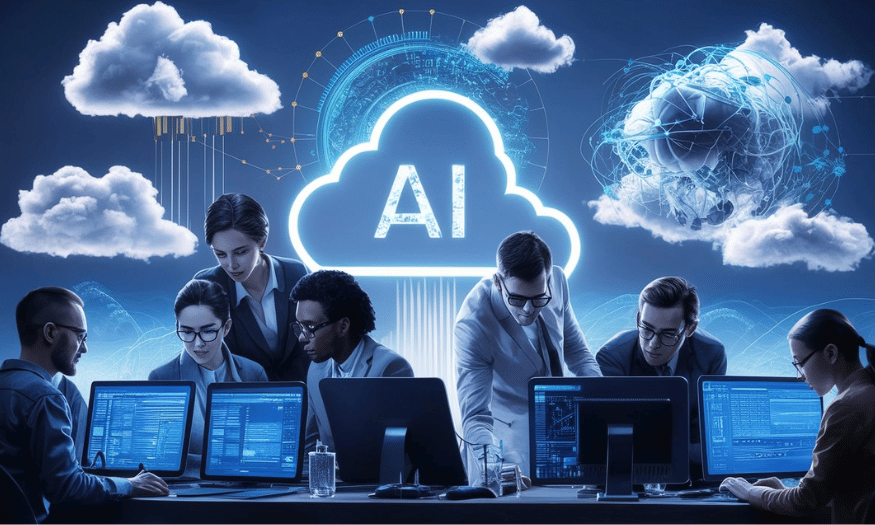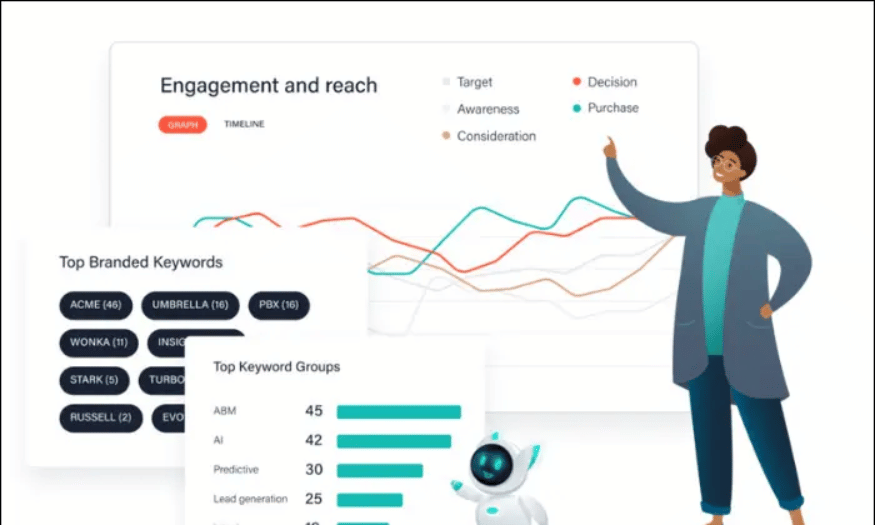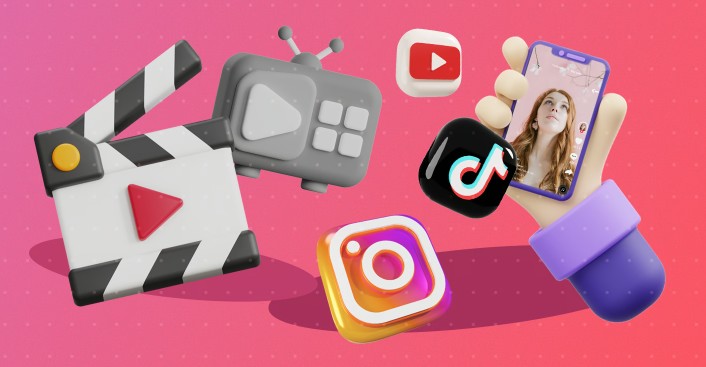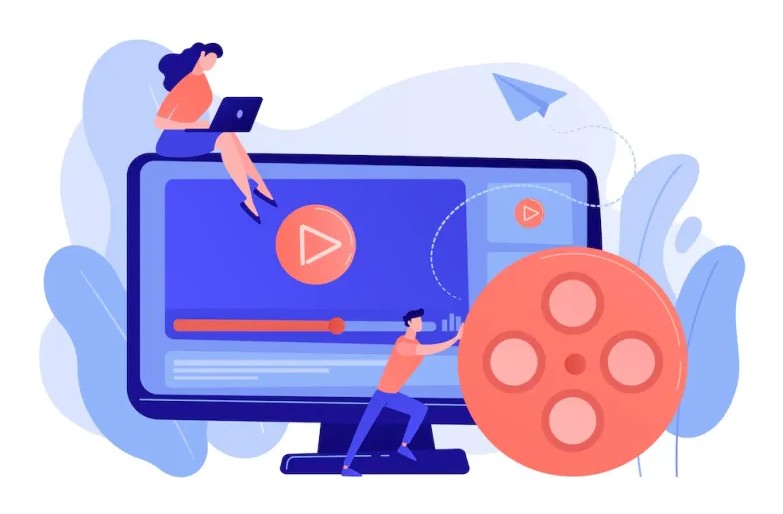Best Selling Products
AI Applications in Business in 2025
Nội dung
- 1. AI application for content creation
- 2. AI application for image design
- 3. Customer service chatbot
- 4. Personalized Advertising
- 5. AI application in human resource management
- 6. Applying AI in accounting and finance work
- 7. AI applications in marketing
- 8. AI applications in healthcare
- 9. AI applications in education
- 10. Conclusion
In the context of rapidly developing technology, artificial intelligence (AI) has become an indispensable part of many businesses' business strategies. In 2025, AI applications will be increasingly popular and diverse, from workflow automation to big data analysis. Businesses not only use AI to improve performance but also to optimize customer experience and make strategic decisions. In this article, Sadesign will review prominent AI applications in businesses, exploring how they are reshaping the way they operate and compete in the market.

In the context of rapidly developing technology, artificial intelligence (AI) has become an indispensable part of many businesses' business strategies. In 2025, AI applications will be increasingly popular and diverse, from workflow automation to big data analysis. Businesses not only use AI to improve performance but also to optimize customer experience and make strategic decisions. In this article, Sadesign will review prominent AI applications in businesses, exploring how they are reshaping the way they operate and compete in the market.
1. AI application for content creation
In the context of increasingly developing technology, artificial intelligence (AI) has become an indispensable tool in the field of content creation. By 2025, applying AI in marketing will not only be a trend but also an essential requirement for businesses to compete effectively. According to Siege Media research, 83.2% of content marketing professionals are expected to actively use AI, marking an increase of nearly 30% compared to the previous year.
AI is capable of providing rich and diverse content ideas. By entering keywords and descriptions, marketers can get creative suggestions, from outlines to full content. This makes it easy for them to create articles for blogs, social media, and email marketing. One of the most popular tools today is ChatGPT, which allows users to interact and receive feedback quickly, thereby enhancing creativity.
The benefits of using AI in content creation are clear. First of all, it saves a lot of time. Thanks to the ability to outline and provide general content, marketers can focus on refining and perfecting content instead of starting from scratch. Second, AI also helps optimize content for SEO, helping businesses increase their rankings on search engines. Finally, the ability to create multi-platform content from existing content allows businesses to expand their reach and attract a wider audience.
2. AI application for image design
In addition to content creation, AI also plays a major role in visual design. Tools like Midjourney, DALL-E, and Canva are using AI to generate visuals based on input data like color, style, and theme. These visuals are not only creative, but also save time and money for communication campaigns.
A typical example is PepsiCo's Tet 2024 campaign, where the company used AI to create unique key visuals that attracted the attention of a large number of consumers. Applying AI in image design allows marketers to easily create media publications such as advertising posters, banners, and social media posts.
The biggest benefit of using AI in visual design is increased efficiency. AI has the ability to automate repetitive tasks, allowing users to focus on more creative work. Additionally, AI also provides unlimited creativity, allowing users to experiment with new ideas without worrying about time. Finally, AI’s automated accessibility checks help ensure that designs meet accessibility requirements, providing a better experience for all users.
.png)
3. Customer service chatbot
Chatbot is a prominent AI application in the field of customer service. With the ability to interact automatically, chatbots help businesses improve user experience by providing quick and accurate information. According to ThriveMyway, the customer satisfaction rate when using chatbots is up to 87.58%, showing the effectiveness of this technology.
One of the biggest benefits of chatbots is their ability to operate 24/7. Unlike human employees, chatbots do not need to rest and can handle hundreds of conversations at once. This reduces the burden on customer support teams and improves response times. Chatbots also have the ability to automate many processes, from ordering to looking up information, saving time and increasing work efficiency.
Big brands like H&M and Starbucks have adopted chatbots to improve customer service. H&M uses chatbots to provide information about product availability, while Starbucks has integrated chatbot technology into its app, allowing customers to place orders using their voice. These apps not only help businesses improve the customer experience but also create stronger relationships with consumers.
4. Personalized Advertising
Personalized advertising is one of the most powerful trends in modern marketing, created based on consumer data to increase the relevance of advertising. This data includes behavior, interests, needs, geographic location, and demographic information. The development of technology has helped businesses not only call customers by name in emails but also understand their interests, needs, and behaviors to provide the most suitable content and services.
According to Epsilon research, 80% of consumers are more likely to make a purchase when a brand provides a personalized experience. In the digital age, personalized advertising has become an important element of marketing campaigns. To implement effective personalized advertising, the first step is to build a 360-degree customer profile. By combining artificial intelligence and a customer data platform (CDP), businesses can create a comprehensive profile from multiple sources, thereby better understanding each customer.
Once you have a customer profile, you can leverage computational advertising—a series of algorithms that allow marketers to deliver ads at the right time, based on a customer’s demographics and online habits. These algorithms make ads more engaging and relevant, improving marketing effectiveness and conversion rates.
A great example of AI being used in ad personalization is Netflix. The streaming giant places a huge emphasis on personalizing the user experience. Netflix uses machine learning to analyze users’ viewing behavior, from viewing time, favorite genres, to search history, to recommend relevant movies and TV shows. The relevance percentage next to each movie title makes it easier for users to find content they love, increasing satisfaction and enhancing the user experience.
.png)
5. AI application in human resource management
In addition to being applied in the business sector, AI is also used in human resource management to improve the efficiency of management and talent development in the organization. According to Gartner statistics in January 2024, 81% of human resource managers are using AI to improve efficiency in their organizations. This shows a strong transformation of the human resource industry in applying new technology to optimize work processes.
One of the most common applications of AI in human resource management is to improve recruitment efficiency. Businesses can use artificial intelligence to search for candidates more effectively. By inputting specific criteria for a job opening, AI can “scan” through huge databases on the internet or online platforms such as LinkedIn, helping to increase the rate of hiring the right person at the right time. One of the prominent platforms in this field is Taleo, developed by Oracle.
In addition to searching for candidates, AI also helps screen resumes quickly and effectively. According to statistics, each recruitment position requires up to 23 hours to screen resumes, but only 12% to 25% of candidates are qualified. AI is capable of screening large numbers of resumes based on established criteria, thereby identifying the candidates most suitable for the job requirements, saving time and resources for businesses.
6. Applying AI in accounting and finance work
As technology continues to advance, artificial intelligence (AI) is rapidly becoming an integral part of the accounting and finance industry. According to Mordor Intelligence, the AI market size in accounting is expected to reach $1.56 billion by 2024 and grow to $6.62 billion by 2029, at a CAGR of 33.5%. This shows that businesses are increasingly aware of the potential of AI to optimize workflows.
One of the prominent applications of AI in accounting is the ability to process data and automate accounting. Optical character recognition (OCR) and natural language processing (NLP) technology help automatically scan and convert information from invoices and documents into digital data. This not only saves time but also reduces errors and improves accuracy in accounting. For example, experts can use AI to quickly classify bank transactions, allowing them to focus on strategic tasks rather than manual processing.
In addition, AI also helps create automatic financial reports and analyze data in more depth. AI tools are capable of synthesizing and analyzing data from many different sources, providing managers with an overview of the financial situation of the business. This not only supports decision making but also helps detect financial risks early, thereby taking timely measures to protect the interests of the business.
.png)
7. AI applications in marketing
In the marketing field, artificial intelligence (AI) has become a powerful tool for businesses to optimize their marketing strategies. Tools like HubSpot and Marketo use AI to analyze customer behavior and recommend personalized advertising campaigns. This not only helps increase conversion rates but also enhances the customer experience by providing the right content at the right time.
Another prominent application of AI in marketing is trend prediction. Machine learning technology is capable of analyzing big data from many different sources, helping businesses identify emerging trends and adjust strategies promptly. For example, tools like Google Analytics use AI to predict consumer shopping behavior, thereby optimizing advertising budgets and increasing campaign effectiveness.
Finally, AI also plays a major role in automating marketing processes. Platforms like Mailchimp allow businesses to automatically send marketing emails based on user behavior. This way, businesses can maintain regular communication with customers without spending a lot of time on manual tasks.
8. AI applications in healthcare
In the healthcare industry, AI is making significant breakthroughs. Tools like IBM Watson Health enable the analysis of big medical data to make faster and more accurate diagnoses. This helps doctors make the best treatment decisions for patients, thereby improving the quality of medical services.
AI is also used in the development of new drugs. Machine learning technology can simulate chemical reactions, helping scientists find effective treatments quickly. For example, BioAge Labs uses AI to analyze biological data to develop anti-aging therapies.
Finally, AI also helps improve the patient experience through applications like health chatbots. These tools can answer common patient questions and direct them to the appropriate services. This not only reduces the workload on healthcare workers but also helps patients get the information they need more quickly.
.png)
9. AI applications in education
In education, AI is changing the way we teach and learn. Tools like Duolingo use AI to personalize the language learning experience, adjusting learning content based on each student’s progress and ability. This increases learning efficiency and keeps learners engaged.
AI also aids in analyzing learning data to improve the quality of education. Platforms like Canvas use AI to track student learning progress and provide timely feedback to instructors. This helps instructors understand the strengths and weaknesses of each student and adjust their teaching methods accordingly.
Ultimately, AI can create complete and interactive online courses. Technology like ChatGPT can help build teaching content, create test questions, and even interact directly with students to answer questions. This not only saves teachers time, but also provides a rich learning experience for students.
.png)
10. Conclusion
In short, AI is increasingly asserting its position in the business sector by 2025. From optimizing production processes, improving customer service to analyzing data and predicting trends, AI not only helps businesses save time and costs but also opens up new opportunities. To survive and develop in the digital age, businesses need to quickly adopt and adapt to advanced AI technologies, thereby creating a sustainable competitive advantage. Grasping and implementing AI applications will determine the success of businesses in the near future.












































